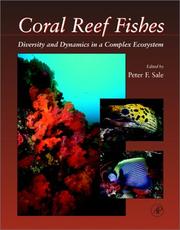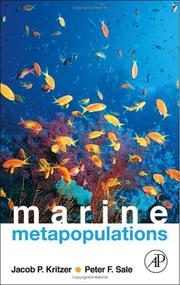| Listing 1 - 4 of 4 |
Sort by
|

ISBN: 1281037354 9786611037352 008053001X 0126151857 9780080530017 9780126151855 Year: 2002 Publisher: San Diego, CA : Academic Press,
Abstract | Keywords | Export | Availability | Bookmark
 Loading...
Loading...Choose an application
- Reference Manager
- EndNote
- RefWorks (Direct export to RefWorks)
Coral Reef Fishes is the successor of The Ecology of Fishes on Coral Reefs. This new edition includes provocative reviews covering the major areas of reef fish ecology. Concerns about the future health of coral reefs, and recognition that reefs and their fishes are economically important components of the coastal oceans of many tropical nations, have led to enormous growth in research directed at reef fishes. Coral Reef Fishes is much more than a simple revision of the earlier volume; it is a companion that supports and extends the earlier work. The included syntheses prov
Coral reef ecology. --- Coral reef fishes. --- Coral reef fishes--Ecology. Coral reef ecology. --- Ecology. --- Zoology --- Health & Biological Sciences --- Vertebrates --- Coral reef fishes --- Coral reefs and islands --- Coral fishes --- Ecology --- Reef ecology --- Coral reef animals --- Reef fishes
Book
ISBN: 128327826X 9786613278265 0520949838 9780520949836 9780520267565 0520267567 6613278262 Year: 2011 Publisher: Berkeley : University of California Press,
Abstract | Keywords | Export | Availability | Bookmark
 Loading...
Loading...Choose an application
- Reference Manager
- EndNote
- RefWorks (Direct export to RefWorks)
Coral reefs are on track to become the first ecosystem actually eliminated from the planet. So says leading ecologist Peter F. Sale in this crash course on the state of the planet. Sale draws from his own extensive work on coral reefs, and from recent research by other ecologists, to explore the many ways we are changing the earth and to explain why it matters. Weaving into the narrative his own firsthand field experiences around the world, Sale brings ecology alive while giving a solid understanding of the science at work behind today's pressing environmental issues. He delves into topics including overfishing, deforestation, biodiversity loss, use of fossil fuels, population growth, and climate change while discussing the real consequences of our growing ecological footprint. Most important, this passionately written book emphasizes that a gloom-and-doom scenario is not inevitable, and as Sale explores alternative paths, he considers the ways in which science can help us realize a better future.
Nature --- Environmental responsibility. --- Ecology. --- Balance of nature --- Biology --- Bionomics --- Ecological processes --- Ecological science --- Ecological sciences --- Environment --- Environmental biology --- Oecology --- Environmental sciences --- Population biology --- Ecological accountability --- Ecological responsibility --- Environmental accountability --- Environmental ethics --- Responsibility --- Anthropogenic effects on nature --- Ecological footprint --- Human beings --- Anthropogenic soils --- Human ecology --- Effect of human beings on. --- Ecology --- Environmental responsibility --- Effect of human beings on --- biodiversity. --- biosphere. --- climate change. --- conservation. --- coral reefs. --- deforestation. --- earth sciences. --- earth. --- ecological footprint. --- ecologists. --- ecology. --- ecosystems. --- environmental impacts. --- environmental issues. --- environmentalism. --- environmentalists. --- field notes. --- fossil fuels. --- historical. --- human condition. --- human impact. --- natural sciences. --- nonfiction. --- overfishing. --- planet death. --- politics and science. --- pollution. --- science and math. --- scientists.
Book
ISBN: 0300258690 Year: 2021 Publisher: New Haven, Connecticut : Yale University Press,
Abstract | Keywords | Export | Availability | Bookmark
 Loading...
Loading...Choose an application
- Reference Manager
- EndNote
- RefWorks (Direct export to RefWorks)
An eye-opening introduction to the complexity, wonder, and vital roles of coral reefs When mass coral bleaching and die-offs were first identified in the 1980s, and eventually linked to warming events, the scientific community was sure that such a dramatic and unambiguous signal would serve as a warning sign about the devastating effects of global warming. Instead, the resulting decades have witnessed yet more degradation. Reefs around the world have lost more than 50 percent of their living coral since the 1970s. In this book, distinguished marine ecologist Peter F. Sale imparts his passion for the unexpected beauty, complexity, and necessity of coral reefs. By placing reefs in the wider context of global climate change, Sale demonstrates how their decline is more than simply a one-off environmental tragedy, but rather an existential warning to humanity. He offers a reframing of the enormous challenge humanity faces as a noble venture to steer the planet into safe waters that might even retain some coral reefs.
Coral reef ecology. --- Coral reef conservation. --- Coral bleaching. --- Climatic changes.

ISBN: 9780120887811 0120887819 9786610633302 1280633301 0080454712 9780080454719 Year: 2006 Publisher: Amsterdam ; Boston : Elsevier Academic Press,
Abstract | Keywords | Export | Availability | Bookmark
 Loading...
Loading...Choose an application
- Reference Manager
- EndNote
- RefWorks (Direct export to RefWorks)
Technological improvements have greatly increased the ability of marine scientists to collect and analyze data over large spatial scales, and the resultant insights attainable from interpreting those data vastly increase understanding of population dynamics, evolution and biogeography. Marine Metapopulations provides a synthesis of existing information and understanding, and frames the most important future directions and issues.* First book to systematically apply metapopulation theory directly to marine systems*Contributions from leading international ecologists and fish
574.3 --- 574.5 --- Populations and environment. Population dynamics --- Hydrobiology. Aquatic biocoenoses and ecosystems. Food chains --- 574.5 Hydrobiology. Aquatic biocoenoses and ecosystems. Food chains --- 574.3 Populations and environment. Population dynamics --- Animal populations --- Marine ecology --- Biological oceanography --- Marine ecosystems --- Ocean --- Aquatic ecology --- Demography, Wildlife --- Populations, Animal --- Wildlife demography --- Wildlife populations --- Animal ecology --- Population biology --- Ecology --- Marine ecology. --- Animal populations.
| Listing 1 - 4 of 4 |
Sort by
|

 Search
Search Feedback
Feedback About UniCat
About UniCat  Help
Help News
News